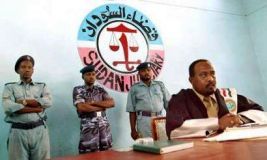Think tank says to achieve Sudan peace, NCP must allow justice
July 18, 2009 (WASHINGTON) –The think tank International Crisis Group
(ICG) says there is one critical precursor for peace in the country’s
westernmost region of Darfur: the country must “dismantle its system
of impunity for atrocity crimes.”
 In a report Friday, the ICG sketches a recent history of the internal
In a report Friday, the ICG sketches a recent history of the internal
deliberation within the National Congress Party (NCP) over how to
react to the arrest warrant against the party’s leader, President Omar
Al Bashir, issued in March 2009 by the International Criminal Court
(ICC).
ICG asserts that “Sudan will have peace only when its impunity system
is dismantled.”
To this end, the research group recommends to the African Union-United
Nations Joint Chief Mediator Djibril Bassolé that he put “judicial
reforms and transitional justice mechanisms such as a truth and
reconciliation commission and vetting procedures prominently on the
Doha agenda,” a reference to peace talks for Darfur in the capital of
Qatar.
The report represents another contribution to an academic and policy
debate — advanced most persistently by the anti-ICC scholar Alex De
Waal – which has focused on the question of “peace first or justice?”
The ICG’s central assertion runs counter to the prevailing direction
of the Darfur peace process and the experience of Sudan’s
Comprehensive Peace Agreement (CPA) of 2005 (undertaken as violence
raged in Darfur), since the CPA did not include significant provisions
for bringing justice against perpetrators of atrocities committed
during the 22-year civil war.
Daniela Kroslak, ICG’s Deputy Africa Program Director said, “Sudan
needs institutional reforms and new policies directed at instituting a
culture of accountability. Short-term deals and quick fixes that
ignore the core issue of impunity for atrocity crimes cannot advance a
sustainable political settlement to the country’s conflicts.”
ICG’s report is based on the assumption that a “ruthless
counter-insurgency and terror campaign led by the government forces
and the Janjaweed militias involved war crimes and crimes against
humanity, most obviously mass displacement,” especially in the period
2003-2004. It uses this as a starting point for asserting that a
culture of impunity prevails in the Sudan.
There are some indications that the NCP has undertaken internal
deliberation over the issue of Darfur war crimes, and the
international response to them. “According to a member of the NCP
political sector, divisions were evident when members of the political
bureau from Darfur, Kordofan and the central states argued for giving
the NCP’s vice presidency to a Darfur figure, reunifying the three
Darfur states into one, with proper regional authority, and removing
land usurpers – concessions that could have led to a final settlement.
Senior hardliners rejected them, arguing they would weaken the party
ahead of elections that were then anticipated to be held in mid-2009,”
states the paper.
This alleged split within the party did not result in a more
conciliatory stance toward the ICC, as more and more party figures
realized that even fundamental political concessions to Darfur
opposition would not necessarily result in a deferral of the ICC
warrant against the party leader. “Once it was recognised that a new
Security Council deferral of the case would have to be sought annually
and that in the meantime other regime figures could be vulnerable, any
engagement with the ICC appeared less attractive,” states the report.
ICG points out that many of the judges in the Sudan are affiliated
with NCP, and therefore “such judges are not independent when dealing
with cases that have implications for their political party and/or
leadership, because their loyalty is with the party that guarantees
their employment and other financial incentives.”
“It is not surprising that investigations headed by such judges found
no rape in Darfur,” concludes ICG.
But ICG speculates that trials of NCP members – if any Sudanese court
were to have the will to undertake them — would not be possible
without triggering a party crisis. The think-tank nevertheless relies
on a broad assertion that “a pervasive culture of impunity has
worsened conflict in Darfur and elsewhere in Sudan.”
Among the think tank’s concluding recommendations is one that offers a
radically different course for the Darfur peace process than the one
currently underway: “the fight against impunity should remain at the
centre of the peace process, deceptively easy trade-offs between peace
and justice should be refused, and political and economic
accommodation at the expense of genuine national judicial processes
for the crimes committed in Darfur should be avoided.”
The International Crisis Group is a non-governmental organisation
offering periodic analysis of some 60 “crisis-affected countries and
territories.”
(ST)
